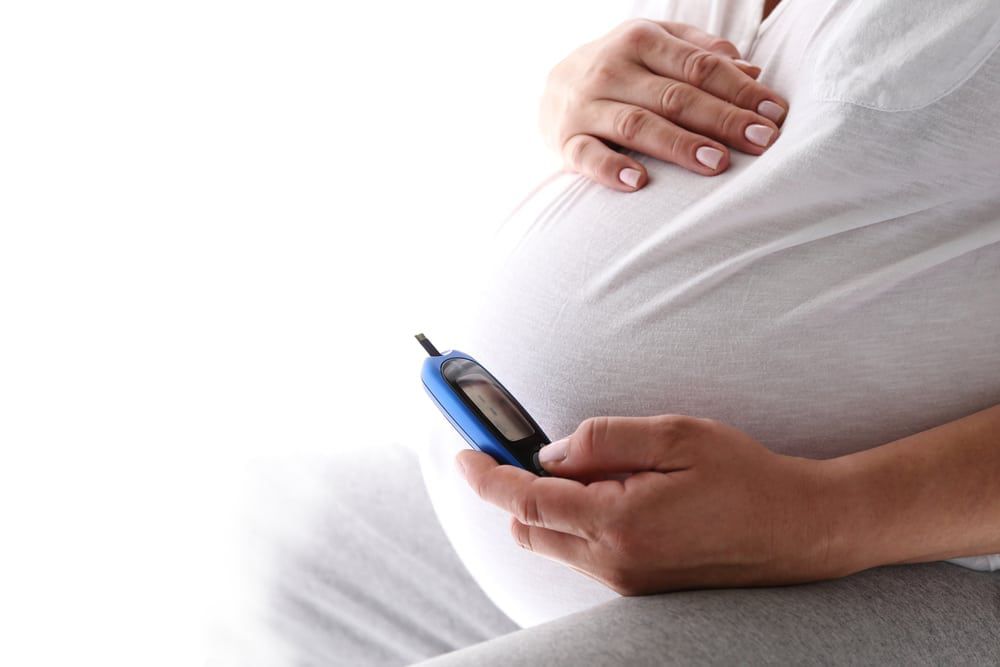When Is It Ordered
Pregnant women are usually screened for gestational diabetes between their 24th and 28th week of pregnancy. You may be screened earlier in your pregnancy if you have signs and symptoms of diabetes or have had gestational diabetes with a previous pregnancy.
You may also be tested earlier in your pregnancy if you are at risk of type 2 diabetes . You may be at risk if you:
- Are overweight, obese, or physically inactive
- Have a first degree relative with diabetes
- Delivered a baby weighing 9 pounds or more or had gestational diabetes with a previous pregnancy
- Have polycystic ovary syndrome
- Are of a high-risk race or ethnicity, such as African American, Hispanic, Native American, Asian American, Pacific Islander
- Have high blood pressure or taking medication for high blood pressure
- Have heart disease
**Some labs may use different numbers.
How Is Gestational Diabetes Diagnosed
Most women are diagnosed using a pathology test, which requires blood samples to be taken before and after a glucose drink. This is known as a pregnancy oral glucose tolerance test . This test is usually performed between 24 and 28 weeks into the pregnancy, or earlier if you are at high risk.
A pregnancy oral glucose tolerance test involves:
- fasting overnight
- having a blood test in the morning
- having a drink containing 75 grams of glucose
- having a blood test one hour after having the drink
- having a blood test 2 hours after having the drink.
Gestational diabetes is diagnosed if any of the results from the test show that your blood glucose is raised.
During COVID-19, further diagnostic guidelines have been added as alternatives to the OGTT where this cannot be performed due to a contagion risk. Check with your doctor or hospital about current guidelines.
What Are The Complications Of Gestational Diabetes
If your blood sugar levels remain high during your pregnancy, this may lead to pregnancy problems such as a large baby, miscarriage or stillbirth. Having a large baby can lead to complications and injury during the birth, and increase the chances of having intervention in labour such as a caesarean birth. But the baby will not be born with diabetes.
If you have gestational diabetes, you are at higher risk of developing high blood pressure while you are pregnant and a 50% increased risk of developing type 2 diabetes in the future. Your baby is also at greater risk of developing type 2 diabetes in later life.
To reduce your risk of developing type 2 diabetes:
- keep to a healthy weight
- eat a healthy diet
- be physically active
- check your blood glucose levels
You can also call Pregnancy, Birth and Baby on 1800 882 436 to speak to a maternal child health nurse for advice and support.
Read Also: Diabetes Cottage Cheese
Tests For Gestational Diabetes
Gestational diabetes is diagnosed using blood tests. Youll probably be tested between 24 and 28 weeks of pregnancy. If your risk is higher for getting gestational diabetes , your doctor may test you earlier. Blood sugar thats higher than normal early in your pregnancy may indicate you have type 1 or type 2 diabetes rather than gestational diabetes.
How The Test Is Performed

TWO-STEP TESTING
During the first step, you will have a glucose screening test:
- You do not need to prepare or change your diet in any way.
- You will be asked to drink a liquid that contains glucose.
- Your blood will be drawn 1 hour after you drink the glucose solution to check your blood glucose level.
If your blood glucose from the first step is too high, you will need to come back for a 3-hour glucose tolerance test. For this test:
- DO NOT eat or drink anything for 8 to 14 hours before your test.
- You will be asked to drink a liquid that contains glucose, 100 grams .
- You will have blood drawn before you drink the liquid, and again 3 more times every 60 minutes after you drink it. Each time, your blood glucose level will be checked.
- Allow at least 3 hours for this test.
ONE-STEP TESTING
You need to go to the lab one time for a 2-hour glucose tolerance test. For this test:
- DO NOT eat or drink anything for 8 to 14 hours before your test.
- You will be asked to drink a liquid that contains glucose .
- You will have blood drawn before you drink the liquid, and again 2 more times every 60 minutes after you drink it. Each time, your blood glucose level will be checked.
- Allow at least 2 hours for this test.
Don’t Miss: Usual Dose Of Metformin
Can Gestational Diabetes Be Prevented
Gestational diabetes often cant be prevented. But you can reduce your risk by being a healthy weight. If you are overweight before you fall pregnant, it is a good idea to try to lose some weight first.
If you are already pregnant and you are overweight, dont try to lose weight now. But its important to keep your weight gain within a healthy range. Your doctor can help you with this. Avoiding too much weight gain in the first two trimesters is a great way of preventing gestational diabetes.
If you have had gestational diabetes in a previous pregnancy, youre at higher risk of developing it again. Your doctor may do an oral glucose tolerance test at around 12 to 16 weeks to check your blood glucose levels, and then again at around 26 weeks.
What Happens During The Oral Glucose Tolerance Test
The oral glucose tolerance test involves quickly drinking a sweetened liquid , which contains 50g of glucose. The body absorbs this glucose rapidly, causing blood glucose levels to rise within 30 to 60 minutes. A blood sample will be taken from a vein in your arm about 60 minutes after drinking the solution. The blood test measures how the glucose solution was metabolized .
You May Like: What Happens If You Have Diabetes
Treatment Options: How To Manage Gestational Diabetes
For most people, gestational diabetes reverses after delivery. However, that doesnt mean you should ignore treatment options during pregnancy!
Properly managing gestational diabetes is key to protecting your baby and ensuring that you have the healthiest pregnancy possible. You must follow the treatment plan provided by your doctor throughout your pregnancy.
The most important element of treating gestational diabetes is to control your blood sugar. Doing so will ensure that it doesnt get too high or stay too high for too long. There are many different ways to achieve this goal.
- Eat a healthy and well-balanced diet that includes plenty of whole foods. Eating the right foods in the right amounts makes it easier to control your blood sugar levels.
- Stay physically active and get regular exercise throughout your pregnancy. This helps encourage your body to use glucose effectively, control your weight, improve your mood, and combat stress.
- Take necessary medications as prescribed by your doctor. These may include insulin or other medications to help regulate your blood glucose levels.
Your doctor will likely ask you to monitor your blood glucose levels every day. Luckily, it is quite easy to check your blood sugar at home with a blood glucose monitor. This will allow you to keep a daily count of your levels to ensure that youre able to manage the condition effectively.
The Initial Causes When Do They Check For Gestational Diabetes
Type 2 diabetes is a common condition in many people. This type is caused by a lack of insulin and is a result of an unhealthy lifestyle. The bodys inability to process glucose from the blood can damage many parts of the body, including the eyes, kidneys, and nerves. Fortunately, there are some things you can do to avoid diabetes. Here are five tips to help you lower your risk: Eat more vegetables and fruits, get regular exercise, and avoid smoking.
High levels of triglycerides in the blood are another factor that can cause diabetes. These triglycerides are caused by a buildup of cholesterol in the blood. A high triglyceride level causes the body to misrepresent insulin as a molecule, which causes glucose to build up in the blood. A simple blood glucose test can confirm your diagnosis of type 2 diabetes. By following these tips, you can begin living a healthy life and avoid the complications of diabetes.
A person with type 2 diabetes must consume less sugar. Glucose causes thirst and dehydration because the body releases energy stores into the bloodstream instead of using insulin. If untreated, diabetes can lead to weight loss and diabetic ketoacidosis, a dangerous condition whereby the cells are deprived of energy. To prevent the condition, you must make sure that your diet is low in glycemic load and that you exercise regularly.
Don’t Miss: Do Skinny People Get Diabetes
How To Lower Your Blood Glucose Levels
Even if you have a normal glucose screening and never test positive for glucose in your urine, its still important to follow a healthy diet during pregnancy, which can help stabilize your blood sugar levels.
Here are some tips on what to eat to keep blood sugar spikes at bay, plus other smart strategies:
How Is Gestational Diabetes Managed
If youre diagnosed with gestational diabetes, you may need more frequent checkups during your pregnancy. Your healthcare provider will check your blood sugar levels regularly. You may need to monitor your blood sugar at home with a tool called a glucose meter.
Some women need medication to manage gestational diabetes. But most women can keep their blood sugar levels under control with diet and exercise.
Recommended Reading: Does Metformin Cause Drowsiness
If Youve Had Gestational Diabetes Before
You will be offered a choice of the following 2 tests to see if you have it again:
- a kit you can use to check your own blood glucose levels from early pregnancy
- an oral glucose tolerance test , which you will have as soon as possible after your booking appointment, and again at 24-28 weeks if the first test is normal.
When To See A Doctor

All pregnant women are screened for gestational diabetes, whether you show any symptoms or not. But you should talk to your doctor if you begin to notice any of the symptoms.
If you do learn that you have gestational diabetes, your doctor may have you visit their office more often for the rest of your pregnancy so they can keep closer tabs on your health. And you might need to follow a strict diet and exercise plan, too, as well as monitor your blood sugar levels or take medicine to control your gestational diabetes.
Also Check: Glycemia Medical Definition
If You Have Gestational Diabetes How Can You Help Prevent Getting Diabetes Later In Life
For most women, gestational diabetes goes away after giving birth. But having it makes you more likely to develop type 2 diabetes later in life. Type 2 diabetes is the most common kind of diabetes. If you have type 2 diabetes, your pancreas makes too little insulin or your body becomes resistant to it .
Heres what you can do to help reduce your risk of developing type 2 diabetes after pregnancy:
- Breastfeed. Breastfeeding can help you lose weight after pregnancy. Being overweight makes you more likely to develop type 2 diabetes.
- Get tested for diabetes 4 to 12 weeks after your baby is born. If the test is normal, get tested again every 1 to 3 years.
- Get to and stay at a healthy weight.
- Talk to your provider about medicine that may help prevent type 2 diabetes.
What Is A Prenatal Glucose Screening
Glucose screening checks for gestational diabetes, a short-term form of diabetes that some women develop during pregnancy. It’s becoming more common in the United States, affecting about 6% to 7% of pregnancies.
The test is usually done at 24 to 28 weeks, but sometimes earlier if a woman is at higher risk for gestational diabetes.
Recommended Reading: What’s The Lowest Dose Of Metformin
If I Am Diagnosed With Gestational Diabetes Will I Need To Monitor My Glucose Levels
If you have been diagnosed with gestational diabetes, your health care practitioner will recommend that you monitor your blood glucose levels to determine how far above or below normal your glucose is and to determine if you need diabetes medications.
Home glucose monitoring at regular intervals is typically recommended. This is usually done using a small instrument called a glucometer and testing strips. You would check your glucose by inserting the test strip into the glucometer and then placing a drop of blood from a skin prick onto the glucose strip. The glucometer then provides a digital readout of your blood glucose level. You will be given guidelines for how high or low your blood sugar should be at different times of the day. By checking your glucose regularly, you can see if the diet and medication schedule you are following is working properly for you.
Staying Aware Of Increased Cardiovascular Risk After The Pregnancy
While gestational diabetes usually resolves after delivery, women who have experienced it have a 68% higher risk of developing cardiovascular disease later in life than women who didnt have gestational diabetes. This risk is there whether the pregnancy was last year or 40 years ago. Women should be aware of their increased risk and be sure their healthcare providers are aware of their medical history.
The Riverside Womens Heart Center specializes in caring for women with this increased risk. To learn more about the cardiovascular risks from a high-risk pregnancy or to make an appointment at the Riverside Womens Heart Center, please visit www.riversideonline.com/womensheart.
Recommended Reading: What Is The Maximum Daily Dose Of Metformin
Gestational Diabetes Is Often Controlled Through Diet And Exercise
The goal of treating gestational diabetes is to get blood glucose close to those of women without gestational diabetes. First, your doctor will help you with a specific meal plan. You will also need to schedule regular physical activity. Sometimes this is enough to lower blood glucose and manage gestational diabetes. Other times, gestational diabetes needs to be treated with insulin. You may also need to do daily blood glucose testing.
You may be able to decrease your chances of developing gestational diabetes by making the same basic lifestyle changes before you get pregnant. Losing weight can lower the risk for type two diabetes in people who are not pregnant, and one of the risk factors for gestational diabetes is being overweight. Eliminating that risk factor before it can become a problem might be helpful.
How Do You Get Gestational Diabetes
Gestational diabetes is a condition that occurs when your body cant produce enough insulin on its own. As a baby develops throughout pregnancy, the mothers body produces human placental lactogen , a hormone that helps the baby develop and grow but can also impact the mothers metabolism. Elevated levels of HPL can increase a mothers blood glucose level and reduce insulin sensitivity.
Gestational diabetes has the potential to occur in any pregnancy, though there are several risk factors associated with this condition, including:
- Age. Women over the age of 25 who conceive are at a greater risk of developing gestational diabetes.
- Weight. Overweight or obese mothers are more likely to develop this condition.
- Ethnicity. Gestational diabetes is more likely to affect certain groups, including African Americans, Hispanic Americans, and Pacific Islanders.
- Genetics. A history of diabetes in the family increases a mothers risk for developing gestational diabetes.
- Prediabetes or previous gestational diabetes. Women who have been diagnosed as prediabetic or who have developed gestational diabetes during a previous pregnancy are more likely to develop gestational diabetes.
Also Check: Is Greek Yogurt Good For Diabetics
Random Blood Sugar Test
This measures your blood sugar at the time youre tested. You can take this test at any time and dont need to fast first. A blood sugar level of 200 mg/dL or higher indicates you have diabetes.
| 140 mg/dL or below | N/A |
*Results for gestational diabetes can differ. Ask your health care provider what your results mean if youre being tested for gestational diabetes.Source: American Diabetes Association
If your doctor thinks you have type 1 diabetes, your blood may also tested for autoantibodies that are often present in type 1 diabetes but not in type 2 diabetes. You may have your urine tested for ketones , which also indicate type 1 diabetes instead of type 2 diabetes.
Combat Common Diabetic Complications With Simple Protective Measures

Gestational diabetes can put mothers at risk of developing type 2 diabetes in the future. And while gestational diabetes often resolves by itself, the same cant be said for other types of diabetes.
If youve been diagnosed with any type of diabetes, its important to understand that there are many different ways to manage your condition and symptoms so that you can enjoy a higher quality of life. One must-have element in any pain management toolbox is a pair of high-quality diabetic socks to help protect your feet and legs from common diabetic foot problems. Non-binding diabetic socks are an affordable, easy, and effective solution to combating symptoms of diabetic neuropathy and protecting your feet from injury and infection.
Also Check: Can Diabetes Make You Dizzy
Ask A Laboratory Scientist
This form enables patients to ask specific questions about lab tests. Your questions will be answered by a laboratory scientist as part of a voluntary service provided by one of our partners, American Society for Clinical Laboratory Science. Please allow 2-3 business days for an email response from one of the volunteers on the Consumer Information Response Team.

